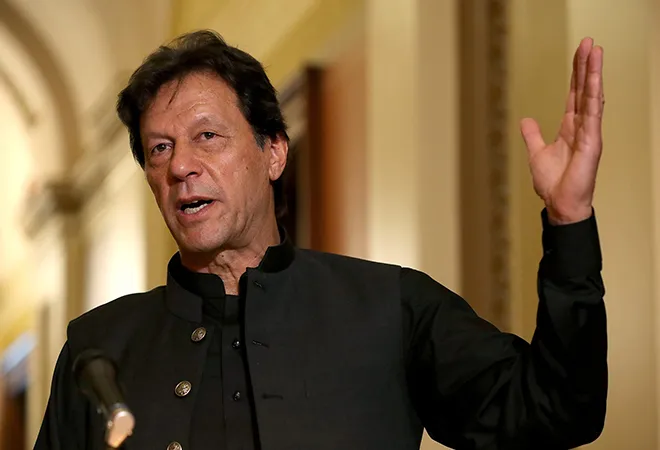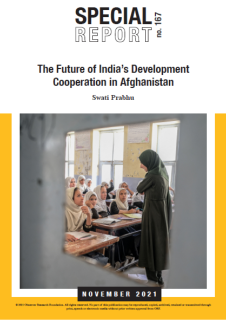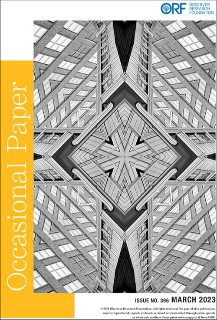
On the eve of the No-Confidence Motion (NCM) that had been moved against the Imran Khan government by the Opposition parties, speculation was rife that the ruling party would play dirty and try and stall the Constitutional process. Imran Khan had been hinting to journalists that he had an ace up his sleeve with which he would surprise everyone. Most analysts believed that the ruling Pakistan Tehreek-e-Insaf (PTI) would create disturbance inside the National Assembly (NA) forcing the Speaker to adjourn the proceedings. There was also talk of street clashes after Imran Khan had exhorted his supporters to come out and protest against the NCM. But this plan was nipped in the bud by the security agencies that were out in strength to ensure that law and order was not disturbed. But what finally happened in the NA was a travesty that took everyone, even the cynics, by surprise. There was nothing but shock and awe over the sheer brazenness with which the Constitution was subverted, and parliamentary norms, proprieties, traditions, and rules were flouted.
A mockery of democracy
The fact that Imran Khan had lost the numbers game was clear for many days. Even without the PTI rebels, the Opposition had managed to cobble together the numbers needed to oust Imran Khan. On Sunday 3 April, the Opposition benches had around 176 members—they needed 172 to oust Imran Khan. Around two dozen of the PTI rebels were in the Parliament but were not in the National Assembly. The number on the treasury benches was around 140. When the proceedings started, the Law Minister Fawad Chaudhry stood up and made out a case based on Article 5 of the Constitution which states that “loyalty to the State is the basic duty of every citizen”. He claimed that the government was in possession of evidence that a foreign power—read United Stateshad hatched a conspiracy to bring about a regime change in Pakistan, and the NCM was part of this sinister plot. He accused the Opposition of being party to this conspiracy, and as such the entire move was a violation of Art.5. He then asked the Speaker to rule, if in light of these revelations, the NCM was valid.
Without much ado, the Deputy Speaker, who was presiding over the session, read out from a prepared script that he had examined the matter and found in favour of the government’s stand point. The Deputy Speaker ruled the NCM invalid and prorogued the House. Almost on cue, it was announced that the Prime Minister would address the nation. Within minutes, Imran Khan was in front of the TV cameras, and he declared that he had advised the President to dissolve the National Assembly and call for fresh elections. He claimed that this was the democratic way to handle the crisis caused by the Opposition becoming part of an international conspiracy against the government. A few minutes later, the President announced that the National Assembly had been dissolved.
Clearly, if there was any conspiracy, it was the one hatched in the Prime Minister’s Office/House by Imran Khan and his closest cronies. According to the analysts in Islamabad, the script of this conspiracy was written primarily by Advisor on Parliamentary Affairs, Babar Awan; Law and Information Minister, Fawad Chaudhry; and perhaps the Attorney General Khalid Javed Khan. Others who were likely in the loop included Special Assistant, Shahbaz Gill; Senator Faisal Javed Khan; and Planning Minister, Asad Umar. The basic material for the conspiracy was provided by Foreign Minister, Shah Mehmood Qureshi. According to the reports in the Pakistani media, a diplomatic memo sent by the ambassador in Washington was spiced up in the foreign office to fabricate an international conspiracy by the Americans against Imran Khan. This was then used to first drum up support on the street and present Imran Khan as the man who was being done down by the Great Satan and its lackies in Pakistan. But when there was no great upsurge on the street, the same conspiracy was used for the Constitutional sleight of hand that happened in the National Assembly on Sunday.
The mockery of the Constitution by the PTI has been done only to serve Imran Khan’s ego. When it had become clear that he wouldn’t be able to defeat the Opposition’s NCM, he sought the army’s help. He was told that he had three options: Resign, face the NCM, or go for fresh elections. The first two options were not acceptable to him because it would mean accepting defeat at the hands of the Opposition. Imran Khan has always been a sore loser, both in cricket and in politics. He, therefore, opted for the third option. The problem was that with the NCM admitted, he couldn’t dissolve the House. The Opposition was not ready to allow him a face-saving option by withdrawing the NCM in return for him dissolving the NA. Hence, his cronies came up with the legal stratagem of dismissing the NCM on some trumped up charge so that he could get the NA dissolved without losing face. While the Interior Minister Sheikh Rasheed claimed that the army was in the loop on the move the government was planning, the official spokesman has categorically denied it. The Director General Inter-Services Public Relations told a couple of TV stations that the army had absolutely no role to play in the reckless behaviour of the government. He said the army did not want to be dragged into this unseemly affair.
Waiting for Supreme Court’s verdict
The matter has now reached the Supreme Court of Pakistan. But the composition of the bench constituted by the Chief Justice doesn’t inspire a lot of confidence in the judiciary delivering justice. The court has issued notices to all and sundry, and instructed all organs and institutions of State to not do anything unconstitutional. The court has also questioned the premise—Art. 5—on which the Speaker made his ruling. But there are broadly two options before the court, and there are precedents for both. The first is that the court rules that the speakers action was unconstitutional and illegal, and it restores the NA and orders the Constitutional process—NCM—to proceed as it is supposed to. The second option is that the court rules that while the action of the Speaker was unconstitutional and illegal, the NA will not be restored and that under the circumstances, the best course of action is to go before the court of the people. In other words, while the court will lay down the law for the future, it will rule in favour of fresh elections. The government is banking upon the court taking the second option.
Constitutionally, once the NA is dissolved, a caretaker government has to be appointed with eight days—three days of consultations between the Prime Minister and Leader of Opposition, both of whom will propose two names; if these two cannot decide, the matter will go before a parliamentary commission in which the treasury and opposition benches have equal representation. This commission will have three days to decide a consensus candidate from the four names proposed by the Prime Minister and Leader of Opposition. If this commission fails, then the Election Commission has to pick a name within two days. After a caretaker Prime Minister is appointed, elections have to be held within 90 days. The process for selecting a caretaker has already kicked off, and unless the Supreme Court rules on the constitutional crisis within the next day or two, it will, in all likelihood, be left with no option but to go for fresh elections.
The second option is that the court rules that while the action of the Speaker was unconstitutional and illegal, the NA will not be restored and that under the circumstances, the best course of action is to go before the court of the people. In other words, while the court will lay down the law for the future, it will rule in favour of fresh elections.
Ironically, the main Opposition party Pakistan Muslim League–Nawaz (PMLN) always wanted early elections. But the constitutional fiddle played by Imran Khan is not acceptable to anyone in the Opposition. If it is allowed to go unchallenged, it will mean that the instrument of no-confidence (an integral part of Parliamentary system) will become infructuous. In any case, the Opposition wanted that once Imran Khan was dislodged, it would cleanse the administration off Imran’s acolytes and then go for new elections. But there are also other complications. While there is no constitutional bar on the National Assembly elections being held separately from provincial assembly elections, traditionally, polls have been held simultaneously. There is as yet no clarity if this will happen this time as well or elections for the provincial assemblies will be held next year as per schedule.
Regardless of whether the elections are held only for the National Assembly or one or more or even all the provincial assemblies, it is unlikely that Imran Khan will win anything. In fact, while he is crowing with pride today over having a pulled a fast one on everyone, in effect, he might well have shot himself in the foot as far as his future political prospects are concerned. Imran, of course, believes that his strident anti-Americanism and his wrapping himself in the flag of Islam and nationalism has revived his support base. His cult is convinced that the positive response in the recently concluded Khyber Pakhtunkhwa (KP) local body polls is evidence that he remains popular and will come back with a bigger majority in the next elections.
The ground realities, however, are not quite the same as the alternate reality in which Imran exists. By all accounts, the PMLN is likely to sweep in Punjab and parts of KP. The PPP will probably retain Sindh. MQM might have a better showing in Karachi and Hyderabad than it had in the 2018 Elections. In KP, the Jamiat Ulema Islam led by Chief Maulana Fazlur Rehman along with PPP and ANP and other parties could win the polls. In Balochistan, it will probably be a mixed result and the typical Khichdi government that is the norm in that province will be instated. Buttressing these back-of-the-envelope election calculations is another ground reality of Pakistani politics. A party that is ousted from office never ever makes a comeback in the elections that follows its ouster.
In case of PTI, there is another factor that will come into play. It simply cannot be allowed to win the next election and form the next government. Imran Khan has pushed Pakistan's relations with the US and the West to the brink, forcing even the Army Chief to do some serious damage control in his speech at the Islamabad Security Dialogues. At a time when Pakistan desperately needs western assistance and access to international financial markets to stay afloat, it simply cannot afford to get on the wrong side of the US, something that will become inevitable if Imran Khan comes back to power a couple of months down the line. But it is not just the US that Imran Khan has ruined relations with. The Saudis and Emiratis are pretty peeved with his antics, the Chinese are also not exactly favourably disposed to him, and India, of course, will not touch him with a barge pole.
It is not just the US that Imran Khan has ruined relations with. The Saudis and Emiratis are pretty peeved with his antics, the Chinese are also not exactly favourably disposed to him, and India, of course, will not touch him with a barge pole.
Actually, India wouldn’t really mind Imran Khan coming back to power given that he has run Pakistan into the ground with his feckless administration, his ruinous economic management, his disastrous foreign policy, and his inability to work with the Pakistan Army, leading to the likely tussle between the two if he were to regain the Prime Minister’s chair. Unfortunately for India, her wishes will not be granted either by the Pakistani masses who have had to suffer the consequences of the disastrous three-and-a-half years of Imran Khan, or by the Pakistani military establishment which knows how precarious the situation is in the country.
Greater instability?
What happens next in Pakistan will become clear in the coming week. But it is clear that Pakistan is entering a phase of greater instability over the next couple of months. This is a crucial phase especially because the economy is tanking and the Pakistani Rupee is collapsing. The foreign exchange reserves are also plunging and the Current Account deficit is once again becoming unsustainable. Debt is mounting as are debt servicing obligations. The International Monetary Fund programme is in jeopardy, and without its backing, access to other multilateral financial institutions and international financial flows will start shutting down. The fiscal hole is expanding alarmingly. Political instability and uncertainty will only add to the economic woes. A very tough budget has to come by mid-June but it is not clear if there will be an elected government in office by that time. Meanwhile, the situation on the western border with Afghanistan is deteriorating.
It is clear that Pakistan is entering a phase of greater instability over the next couple of months. This is a crucial phase especially because the economy is tanking and the Pakistani Rupee is collapsing.
The Pakistan Army meanwhile finds itself in a bind. Its Imran project has been a spectacular flop. But the losses it has inflicted seems to have left the producers of this hybrid regime shell-shocked. Just when Pakistan is staring at a perfect storm approaching, Imran Khan has decided to go ahead and set the house on fire. If Imran is allowed to get away with his pyromania, others too will be emboldened to set their own fires. But shutting down Imran Khan means going back to the much-disliked Nawaz-Zardari type of politicos. No wonder even some of the most hard-nosed Pakistan watchers in New Delhi are starting to feel sorry for the predicament in which the Pakistan Army and the country it runs finds itself in.
The views expressed above belong to the author(s). ORF research and analyses now available on Telegram! Click here to access our curated content — blogs, longforms and interviews.




 PREV
PREV


